
The Liberal Party was one of the two major political parties in the United Kingdom, along with the Conservative Party, in the 19th and early 20th centuries. Beginning as an alliance of Whigs, free trade–supporting Peelites, and reformist Radicals in the 1850s, by the end of the 19th century, it had formed four governments under William Gladstone. Despite being divided over the issue of Irish Home Rule, the party returned to government in 1905 and won a landslide victory in the 1906 general election. Under prime ministers Henry Campbell-Bannerman (1905–1908) and H. H. Asquith (1908–1916), the Liberal Party passed reforms that created a basic welfare state. Although Asquith was the party leader, its dominant figure was David Lloyd George.
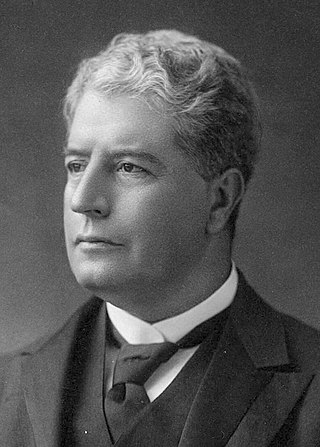
Sir Edmund "Toby" Barton was an Australian statesman, barrister and jurist who served as the first prime minister of Australia from 1901 to 1903. He held office as the leader of the Protectionist Party, before resigning in 1903 to become a founding member of the High Court of Australia, on which he served until his death. Barton was highly regarded as one of the founding fathers and leaders of the Federation movement, and for his work in drafting and later interpreting the Constitution of Australia and early commonwealth laws.
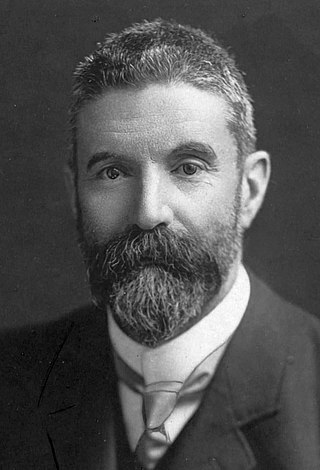
Alfred Deakin was an Australian politician, statesman and barrister who served as the second prime minister of Australia from 1903 to 1904, 1905 to 1908 and 1909 to 1910. He held office as the leader of the Protectionist Party, and in his final term as that of the Liberal Party. He is notable for being one of the founding fathers of Federation and for his influence in early Australian politics.

Sir George Houston Reid was an Australian and British politician, diplomat and barrister who served as the fourth prime minister of Australia from 1904 to 1905. He held office as the leader of the Free Trade Party, previously serving as the 12th premier of New South Wales from 1894 to 1899, and later as the High Commissioner of Australia to the United Kingdom from 1910 to 1916.
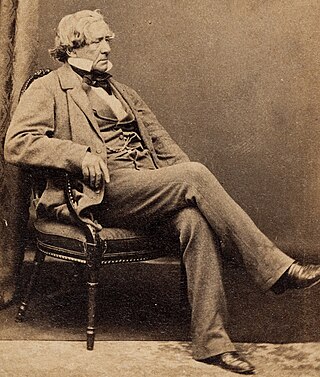
William Charles Wentworth was an Australian statesman, pastoralist, explorer, newspaper editor, lawyer, politician and author, who became one of the wealthiest and most powerful figures in colonial New South Wales. He was among the first colonists to articulate a nascent Australian identity.
The Free Trade Party, officially known as the Free Trade and Liberal Association, and also referred to as the Revenue Tariff Party in some states, was an Australian political party, formally organised in 1887 in New South Wales, in time for the 1887 New South Wales colonial election, which the party won.
The Protectionist Party, also known as the Protectionist Liberal Party or Liberal Protectionist Party, was an Australian political party, formally organised from 1887 until 1909, with policies centred on protectionism. The party advocated protective tariffs, arguing it would allow Australian industry to grow and provide employment. It had its greatest strength in Victoria and in the rural areas of New South Wales. Its most prominent leaders were Sir Edmund Barton and Alfred Deakin, who were the first and second prime ministers of Australia.
The Liberal Party was a parliamentary party in Australian federal politics between 1909 and 1917. The party was founded under Alfred Deakin's leadership as a merger of the Protectionist Party and Anti-Socialist Party, an event known as the Fusion.
In the United Kingdom, the word liberalism can have any of several meanings. Scholars primarily use the term to refer to classical liberalism. The term can also mean economic liberalism, social liberalism or political liberalism. It can simply refer to the ideology and practises of the historic Liberal Party (1859–1988), or in the modern context, of the Liberal Democrats, a UK party formed after the original Liberal Party's demise.
In Australia, liberalism has a vast interpretation and a broad definition. It dates back to the earliest Australian pioneers and has maintained a strong foothold to the present day. Modern-day Australian liberalism is the successor to colonial liberalism, and has been compared to British liberalism for its similarity. The primary representation of Australian liberalism is the centre-right Liberal Party of Australia. Unlike in the United States, liberalism in Australia, and the term "liberal", is often associated with conservatism.

Sir William John Lyne KCMG was an Australian politician who served as Premier of New South Wales from 1899 to 1901, and later as a federal cabinet minister under Edmund Barton and Alfred Deakin. He is best known as the subject of the so called "Hopetoun Blunder", unexpectedly being asked to serve as the first Prime Minister of Australia but proving unable to form a government.

The Federation of Australia was the process by which the six separate British self-governing colonies of Queensland, New South Wales, Victoria, Tasmania, South Australia, and Western Australia agreed to unite and form the Commonwealth of Australia, establishing a system of federalism in Australia. The colonies of Fiji and New Zealand were originally part of this process, but they decided not to join the federation. Following federation, the six colonies that united to form the Commonwealth of Australia as states kept the systems of government that they had developed as separate colonies, but they also agreed to have a federal government that was responsible for matters concerning the whole nation. When the Constitution of Australia came into force, on 1 January 1901, the colonies collectively became states of the Commonwealth of Australia.

Radicalism was a political movement representing the leftward flank of liberalism during the late 18th and early 19th centuries. Certain aspects of the movement were precursors to modern-day movements such as social liberalism, social democracy, civil libertarianism, and modern progressivism. This ideology is commonly referred to as "radicalism" but is sometimes referred to as radical liberalism, or classical radicalism, to distinguish it from radical politics. Its earliest beginnings are to be found during the English Civil War with the Levellers and later the Radical Whigs.

Sir Alexander James Peacock was an Australian politician who served as the 20th Premier of Victoria.
The history of New South Wales refers to the history of the Australian state of New South Wales and the area's preceding Indigenous and British colonial societies. The Mungo Lake remains indicate occupation of parts of the New South Wales area by Indigenous Australians for at least 40,000 years. The British navigator James Cook became the first European to map the coast in 1770 and a First Fleet of British convicts followed to establish a penal colony at Sydney in 1788.
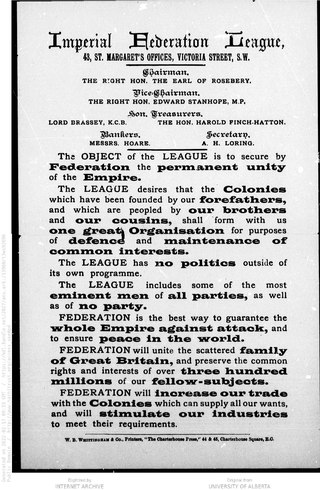
The Imperial Federation League was a 19th-century organisation which aimed to promote the reorganisation of the British Empire into an Imperial Federation, similarly to the way the majority of British North America confederated into the Dominion of Canada in the mid-19th century. The League promoted the closer union of the British Empire and advocated the establishment of "representative government" for the UK, Canada and the self-governing colonies of 'Australasia' and Cape Colony within a single state.

Henry Richard Nicholls was an Australian journalist and newspaper editor. He was born in England and was active in the Chartist movement before arriving in Australia during the Victorian gold rush, where he was associated with the Eureka rebellion. He was editor of The Star in Ballarat before moving to Hobart in 1883, where he edited The Mercury until his death in 1912. The conservative H. R. Nicholls Society was named in his honour.
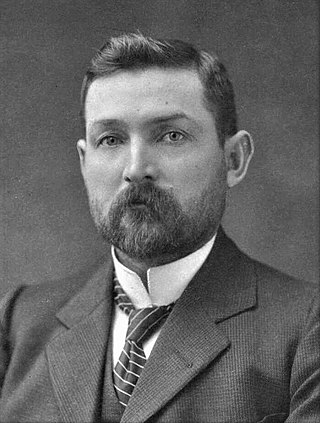
The Watson government was the third federal executive government of the Commonwealth of Australia. It was led by Prime Minister Chris Watson of the Australian Labor Party from 27 April 1904 to 18 August 1904. The Watson government was the first Labor Party national government in both Australia and in the world. Watson was aged just 37 when he became Prime Minister of Australia, and remains the youngest person to have held the post.

The second Deakin government was the period of federal executive government of Australia led by Prime Minister Alfred Deakin. It lasted from 5 July 1905 to 13 November 1908. Deakin was the second prime minister of Australia, having previously led the Deakin government (1903–1904), and held the office again in 1909–1910.
The Liberal Party, often known simply as the Liberals, was the name used by a number of political groupings and parties in the Victorian Parliament from the late 19th century until around 1917.












